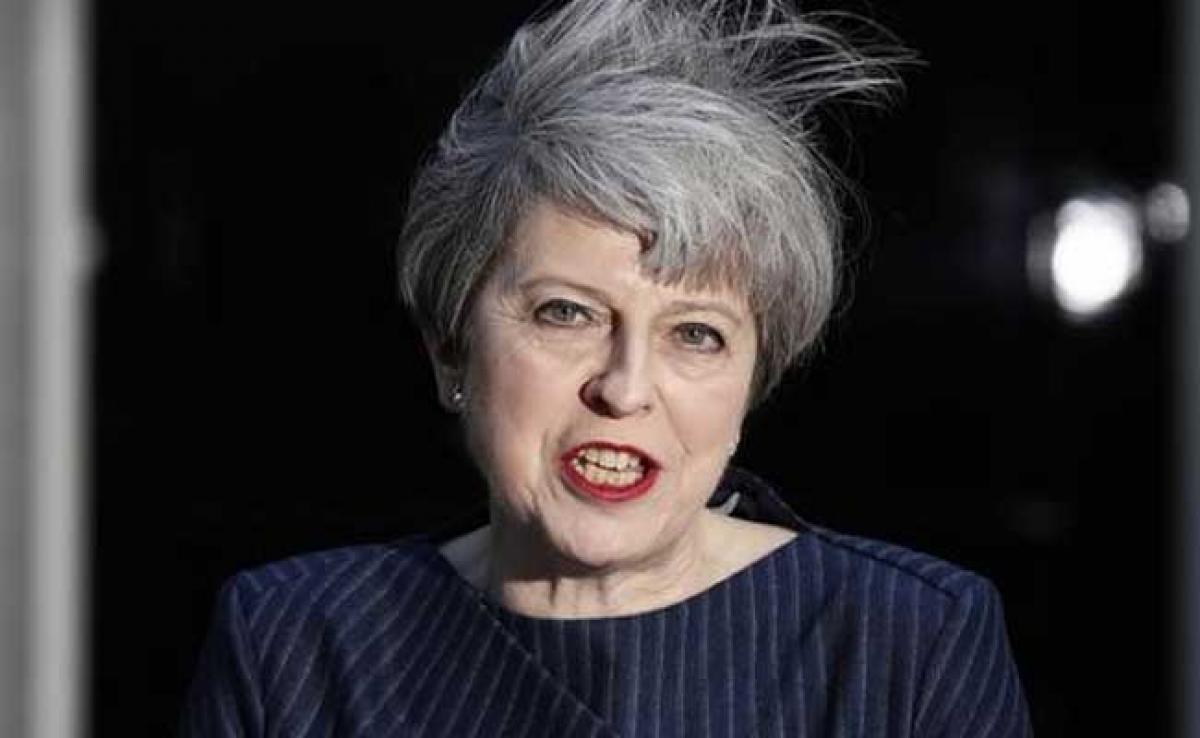Live
- G20 Leaders Will Talk About Climate, Taxes, and Trump's Return in Brazil
- COP29: CDRI announces $8 million funding for 12 projects to address climate crisis
- Anti-Telgu remarks: Actor Kasthuri Shankar moves court for bail
- Samsung AR Smart Glasses Set to Launch in 2025, Featuring Ray-Ban Meta-Like Design
- Kerala Industries Minister confident that new policy will boost plantation sector
- Madras HC plans inter-departmental monitoring committee to combat drug use in TN
- Bihar: Spotted deer dies due to heart attack in Banka district
- Mushtaq Ali T20: Shami to spearhead Bengal bowling attack, Gharami named captain
- Kharge's clarion call to oust Maharashtra's BJP-backed MahaYuti
- Why Ukraine’s Use of US Missiles Against Russia Could Lead to World War 3
Just In

British Prime Minister Theresa May said Wednesday she wanted a \'mandate to complete Brexit\', as MPs looked set to approve her bombshell call for a snap general election in June.
British Prime Minister Theresa May said Wednesday she wanted a 'mandate to complete Brexit', as MPs looked set to approve her bombshell call for a snap general election in June.
In fiery exchanges in the House of Commons, Ms May repeated that the vote would strengthen her hand against domestic critics seeking to 'frustrate the process' of leaving the European Union, which formally began last month.
"I will be asking the British people for a mandate to complete Brexit and to make a success of it", the Conservative leader said, to cheers from her lawmakers sitting behind her.
Ms May stunned the country on Tuesday when she announced plans to call a snap election on June 8, despite having repeatedly said she would wait until the next vote scheduled in 2020.
She is seeking to increase her slim majority of 17 in the 650-seat Commons before the battles begin with the EU over Britain's exit bill and future trade and immigration ties.
Ms May insists an early election would provide 'certainty and stability' in the negotiations, which will now start after the vote.
In a sign of the key campaign issues ahead, Ms May traded barbs in the Commons with opposition Labour leader Jeremy Corbyn, whose party is deeply divided and languishing up to 20 points behind the Conservatives.
Mr Corbyn accused the government of 'broken promises' on health, education and the economy during its seven years in office.
Ms May hit back that Labour offered only 'bankruptcy and chaos', but denied she was complacent, saying, "We will be out there fighting for every vote".
Election Landslide
British elections are fixed in law but the 2020 date can be changed with a two-thirds majority in the Commons, and with Labour's support, the motion put Wednesday for a June vote is expected to pass easily.
All sides are now gearing up for the fourth major election in four years, after last June's shock referendum vote for Brexit, the 2015 general election, and the 2014 Scottish independence vote.
Brexit will dominate the campaign, with Ms May, who took office after David Cameron resigned following the EU vote, seeking public backing for her plan to pull Britain out of Europe's single market.
A European Commission spokesman said the 'real political' negotiations on Brexit will start after the election.
Three weekend opinion polls put the Conservatives about 20 points ahead of Labour, and if translated into votes, this could give Ms May an 'election landslide' with a majority of more than 100, according to an analysis by The Times.
Ms May, Britain's second female prime minister, also has strong popular support for her handling of the political earthquake unleashed by Brexit.
By contrast Labour is wracked by divisions, over Brexit and Corbyn's left-wing leadership, which is opposed by many of his more centrist MPs.
So far, Labour's stance on Brexit has been to allow the government to go ahead with the EU divorce, but only under certain conditions, such as retaining strong economic ties with the bloc.
That approach risks satisfying neither its traditional working-class supporters, many of whom backed the EU, or its urban, pro-European backers, leaving many commentators predicting an electoral bloodbath.
Three Labour MPs have already announced they will not stand again. Former Conservative finance minister George Osborne, a powerful voice in favour of Britain's EU membership during the referendum campaign, also said he would not seek re-election.
Scotland's Mandate
The smaller Liberal Democrats, who lost most of their seats in 2015 after entering coalition with the Conservatives, are hoping to capitalise on their strong support for the EU to win new support.
Meanwhile the Scottish National Party, which holds most of the seats in Scotland, is pushing its demands for a second referendum on independence in order to maintain close ties with the EU.
"Make no mistake, if the SNP wins this election in Scotland, and the Tories don't, then Theresa May's attempt to block our mandate to hold another referendum when the time is right, will crumble to dust," SNP leader and Scottish First Minister Nicola Sturgeon said.
Like almost everyone else in Britain, the election announcement caught financial markets off guard, amid concerns of the economic implications of Brexit.
The pound rallied on speculation that ms May will be returned with a stronger mandate, but this caused London's FTSE 100 index, which features many multinationals earning in dollars, to fall.
If MPs approve the election, parliament would hold its last session on May 2 and the campaign would begin in earnest.

© 2024 Hyderabad Media House Limited/The Hans India. All rights reserved. Powered by hocalwire.com







